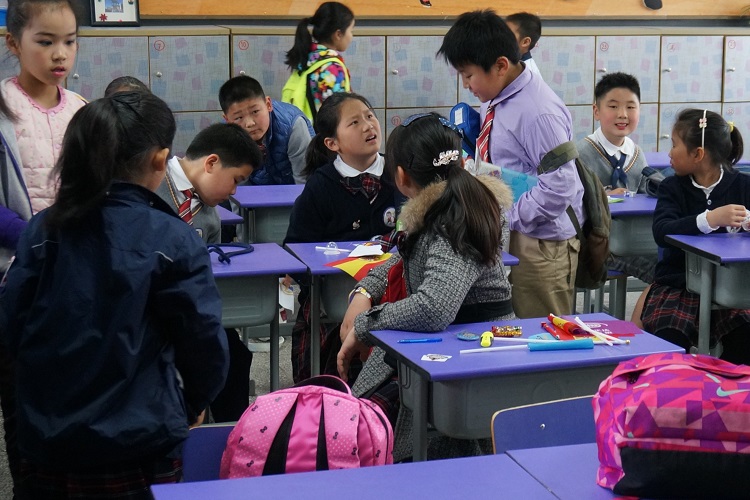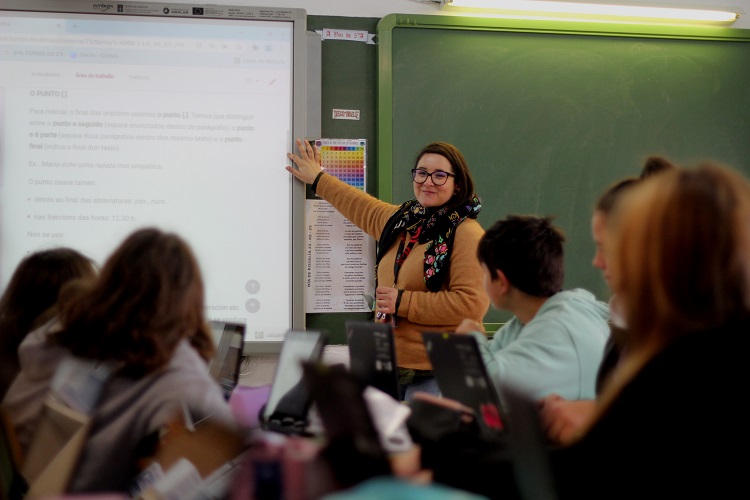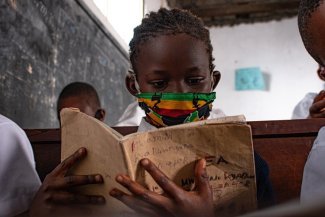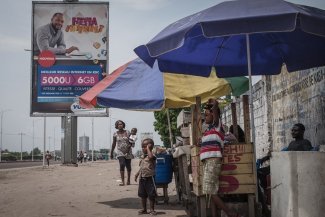

Against a backdrop of globalisation and fierce competition between economies, with automation, digitalisation and artificial intelligence for the masses moving ahead at full speed, which approach to education (without falling into dichotomies) is best suited to respond to these challenges?
A teacher comes to class and tells his students to get a copy of the phone book and learn it by heart, all of its one thousand pages. A philosophy student immediately asks “why?” A political science student says: “I don’t agree!” and starts organising a demonstration in front of the professor’s office. Finally, a medical student asks: “When is it for?” This joke, admittedly a bit of a jab at hard-working medical students, points to one of the Achilles heels of today’s education systems: critical thinking.
What exactly are our younger generations being prepared for today, and how? One major problem, which many of the articles compiled for this special issue highlight, is the growing commercialisation of education. In general terms, this translates to less public education, fewer resources, more competition between educational institutions and their increasing alignment with the needs of companies, as well as the ongoing integration of technology into education. This vision of education sets aside humanist values in favour of performance and productivity (or turns education into a business, plain and simple). Instead of emancipating people, it prepares them to assume their place in the economy; instead of creating citizens, it creates consumers.
Against a backdrop of globalisation and fierce competition between economies, with automation, digitalisation and artificial intelligence for the masses moving ahead at full speed, which approach to education (without falling into dichotomies) is best suited to respond to these challenges?
According to Belgian-Luxembourg essayist Nicolas Hirtt, a worrisome but increasingly widespread reality is one in which schools prepare young students to be “adaptable workers, not by developing their ability to understand change but by eliminating their ability to resist it”. “Education is about helping each individual to grow, giving each person the ability to explore their potential, their talent, their way of thinking,” as well as giving them “the experience and the ability to be in society, to learn the values of the culture in which they live” and to find their place in the world, says Martin Henry, research coordinator at Education International, in an interview with José Álvarez Díaz.
Decent work in the education sector is, of course, also at the heart of this debate. Whether in Viktor Orbán’s Hungary or in the pre-coup Republic of Niger, the job insecurity that teachers face has a profoundly negative impact on their students.
Beyond these conflicting views of education, we at Equal Times have also been concerned with the broader societal contexts that affect childhood and adolescent education, from armed conflict, which targets schools, to extreme poverty that limits girls in particular.
In this summer special dedicated to education, we’ve selected a series of articles which, beyond highlighting the obstacles that teachers face and the resilience they display, invite reflection and propose plausible alternatives.
The future of education: are the real needs of students being neglected in favour of grades and test scores?
By José Álvarez Díaz

Students at a private primary school prepare for the start of classes in a high-income neighbourhood in the Pudong district of Shanghai, China.
[…] Pasi Sahlberg, former director general of the Finnish Ministry of Education and currently professor of education at Southern Cross University in Lismore, Australia, is one of the world’s leading experts in the global debate on how to improve education. For years, he has been critical of the careless application of neoliberal dogmas of competition and free markets to education. What he calls the Global Education Reform Movement, or GERM, has indeed spread across the globe like a virus, wreaking havoc in its wake.
As Sahlberg tells Equal Times: “Market-based education policies and management models became common in the 1990s as a consequence of what is known as New Public Management in England, the US and much of the rest of the Western world. It is based on very simple marketplace logic: The quality of schools will improve when parents can choose the best available school for their children.” This ability to chose means that instead of collaborating within a common system, schools are given greater autonomy to compete against one another for pupils.
However, as Sahlberg explains, studies show that education models of this kind have thus far failed to improve the quality of teaching. While there is increasing awareness of the problem, “we are still missing much of the important aspects of education outcomes that are being slowly recognised in education debates”. […]
Read the full article on Equal Times
Occupation: girl
By Ignacio Marín

18.00 in the evening: at the end of the day, when she has finally finished all her chores, Qello finds some time to study and do her homework, by the light of a small lantern.
[…] Access to education in Ethiopia is a particularly tough challenge for girls, who face all kinds of obstacles. There are only 70 girls, on average, for every 100 boys in secondary school in Ethiopia. The reason for this is that many families see little point in educating their daughters and prioritise the schooling of their male children. When money is short, the girls are the first to have to leave their studies. In some cases, poverty and a lack of financial alternatives means that many families find themselves having to marry off the girls whose upkeep they can no longer afford. A drought or a bad harvest can lead to a wedding.
As Ana Sendagorta, director of the Pablo Horstmann Foundation, explains: "More than half of Qello’s classmates will be married off before they reach adulthood, if they aren’t already married. And, unfortunately, they will all end up leaving their studies shortly after the wedding." According to UNICEF, only 47 per cent of girls and young women – aged between 15 and 24 – know how to read and write in Ethiopia. […]
Read the full article on Equal Times
Schools, a target of war
By Ethel Bonet and Diego Ibarra Sánchez

Millions of children’s basic rights to protection and education are violated around the world. Portrait of 14-year-old Darija Nikolajenko in front of what is left of her school, which was shelled by Russian forces on 3 March 2022. 27 September 2022, Chernihiv, Ukraine.
[…] Attacks on schools in the context of armed conflict have become a growing and alarming trend worldwide. During 2020 and 2021, over 5,000 attacks on education or incidents involving the military use of schools and universities were reported, in which at least 9,000 students and educators were harmed or killed. On average, six attacks on education or incidents of military use took place every day.
From Afghanistan to Yemen, Syria, South Sudan, Mali, Democratic Republic of Congo, Ukraine and Colombia, warring parties are flouting “one of the most basic rules of war: the protection of children,” says UNICEF.
“Children are direct targets in conflicts around the world. We cannot accept this as the new normal,” warns UNICEF’s executive director, Catherine Russell, recalling that “a child’s right to education cannot be safeguarded in conflict situations without protecting education itself”. […]
Read the full article on Equal Times
What impact will artificial intelligence have on education?
By José Álvarez Díaz

The growing popularity of artificial intelligence (AI) software, capable of generating images, sound and even text in a matter of seconds, is opening up a debate on technological transformation. In this February 2023 image, a teacher in A Coruña, Spain, gives a lesson in a classroom where technology, for the time being without artificial intelligence, is ubiquitous.
[…] “No need to panic, but there is a need for change,” Rose Luckin, researcher at the Knowledge Lab at University College London (UCL) and professor of learner-centred design at the UCL Institute of Education, tells Equal Times. “Education systems across the globe vary and some are better prepared than others to enable their students to coexist with and indeed benefit from living and working with AI,” says Luckin, a leading expert on this technology’s impact on education.
“Education systems that focus on learning facts and testing students about the extent to which they can process information and remember and reproduce it, are not preparing students well for a future workplace where these types of skills and abilities will be done by AI systems.” But, she argues, those “that help students develop a sophisticated understanding of themselves as learners and of what knowledge is, where it comes from, how to make judgements about what good evidence is and make good judgements about what to believe, and most important of all, how to be good at learning, will build their students capabilities to thrive in a world where they coexist with many different types of artificial intelligence.” […]












